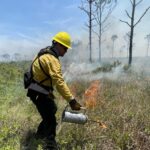
FELLSMERE – The City of Fellsmere is rolling out the green carpet for a new alternative fuel company hoping to change the way Americans gas up their vehicles.
Green Flight International, of Apopka, has secured two acres of city-owned land off Willow Street where it will plant experimental crops of elephant grass and energy cane, which will be harvested to feed algae.
That algae would then be processed, extracting its oils to become a liquid alternative to petroleum.
“It’s good all the way around,” said Fellsmere City Manager Jason Nunemaker.
Not only would the city attract new businesses, but those businesses could then, in turn, create jobs, help the environment, and make Fellsmere a truly self-sustaining city by becoming energy independent.
Green Flight International has gained recognition for promoting bio-fuels. It has flown a jet across the country – from California to Florida – running a bio-diesel fuel of soy and animal fat. Now, the company wants to come up with a more cost-effective earth-friendly fuel based on algae.
Douglas Rodante, the president and CEO of Green Flight International, said algae-based fuel is the way to go because of how quickly the algae can be cultivated. Soy, canola and ethanol are time consuming and can put a strain on the food supply.
Neither algae nor its food stock are in the food chain – and neither would take up space on traditional food supply farms.
The elephant grass and energy cane the company will grow on Fellsmere’s property will be harvested for its cellulose (its sugars), which would then be fed to the algae. After a time, the algae would then be drained of its water and processed to extract its oil. The oil, then, would be refined into fuel and the fuel’s by-products – much like petroleum.
“It’s the fuel of the future,” Rodante said.
Scientists are working to create a cost-efficient liquid fuel to replace petroleum as a gasoline, diesel, bio-diesel and even jet fuel – among others. The trick, however, has been finding a bio-fuel that easily works in the existing infrastructure.
Rodante said that his company chose Fellsmere as a test site for the crop after someone he knows told him of how willing and open the city council is to such endeavors.
Rodante added that the city has already been very welcoming and accommodating and they haven’t planted anything yet at the site.
They expect to plant the first crop sometime in November and, in the meantime, are preparing the soil for planting.
Green Flight International’s plans include more than planting algae-feeding crops. Rodante said they hope to establish a pilot plant facility to grow and process the algae somewhere in the city.
The pilot facility is not contingent on the success of the crop, according to Rodante. Instead, it hinges on the Fellsmere city government. He explained that he is hoping to work out an arrangement with the city to locate the facility within the city’s limits.
Whether Green Flight International would buy or lease land from the city remains to be seen as negotiations evolve.
“Fellsmere is a prime location,” Rodante said, explaining that the city has plenty of agricultural land, an experienced farming workforce, and viable soil and adequate rainfall.
If the pilot plant facility shows positive signs, Green Flight International would look at establishing a full scale corporate plant facility were it could grow the feed stock, produce and process the algae and refine the oil into fuels.
Rodante said that they could get started on a corporate facility within 18 to 24 months of the start of the pilot plant’s operation.
Again, Green Flight International would want to locate its corporate facility inside Fellsmere, given the city’s willingness to work with the company and the vast amounts of agricultural land, according to Rodante.
“This is the type of activity we want to encourage,” City Manager Jason Nunemaker said of attracting eco-friendly businesses.





